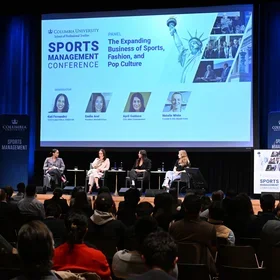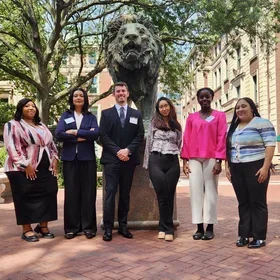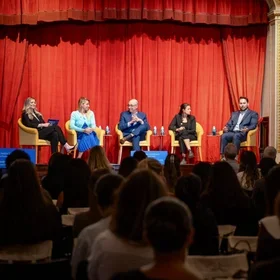Sarah Holloway, a member of the faculty at the School of International and Public Affairs, joined SPS this summer as the interim program director for the M.S. in Nonprofit Management. As a senior lecturer in the discipline of international and public affairs at SIPA, Holloway teaches Nonprofit Financial Management, Social Entrepreneurship, and Design for Social Innovation. She is the director of SIPA’s Management Specialization, a set of courses and activities that support knowledge and skill-building for nonprofit, for-profit, social enterprise management, and government leadership roles. She is the co-founder of six ventures in K-12 education, including MOUSE.org and Computer Science for All (CSforAll). She recently discussed her extensive experience across the nonprofit sector and her vision for the program.
Tell us about your background. What are you most passionate about in the nonprofit sector? What motivates your teaching and your work?
I have been working at the intersection of entrepreneurship, education, and equity for nearly three decades. My portfolio of work has included the co-founding and running of nonprofits focused on K-12 public education and the digital divide and also education access and affordability. I love start-ups and taking an idea and turning it into a reality. I am committed to sharing my experience and passion with students—which I do at Columbia’s School of International and Public Affairs (SIPA) and now at the M.S. Nonprofit Management program.
What classes will you be teaching during the coming academic year?
In the fall I am teaching two courses: Design for Social Innovation at SIPA, and a capstone called Design for Social Innovation at SPS. In the spring, I am teaching Design for Social Innovation at SIPA, which is open to the Columbia community broadly. Last term we had twelve schools representing both undergraduate and graduate students. I love teaching both of these courses as they involve a process called “human centered design,” which requires that students really explore the problem they are trying to solve—everything from energy to education—by doing intensive “need finding” and customer discovery. This includes both research and dozens and dozens of interviews with those they are solving for. I co-teach this class with Columbia’s Designer in Residence, Adam Royalty.
The goal is for students to leave this program with confidence, contacts, and the knowledge needed to become effective and exemplary leaders in the nonprofit sector.
Who should apply to the Nonprofit Management program?
Anyone who is interested in learning more about the critical role nonprofits play in solving global problems as well as the skills they need to start, run, govern, resource, and/or grow these organizations. Nonprofit management is unique in many ways. I would argue if you can successfully run a nonprofit, you can run anything. Nonprofit management requires wearing many hats, being open to pivoting as the world changes, and finding ways to leverage and utilize what are often limited resources.
What can students look forward to in the coming academic year?
Students can expect access to a variety of robust programming and activities—from networking, mentoring, and learning new skills—that will supplement their coursework and prepare them for their journeys here at Columbia and beyond. Additionally, students will have the opportunity to take new courses that will be offered in the program this year and next, including courses covering social impact measurement, impact investing, and entrepreneurship.
What are you hoping students will take away from their time in the program?
Students should leave this program ready to meet the challenge of measuring impact, doing more with less, and ready to rise to help meet unmet need here in the U.S. and around the world. The goal is for students to leave this program with confidence, contacts, and the knowledge needed to become effective and exemplary leaders in the nonprofit sector.
What is your vision for the future of the program?
We are in a critical time in history and the nonprofit sector will need to be at the forefront of problem solving. This will require thinking about things in new ways, reframing and coming up with innovative solutions. It is my vision that the program evolves as the world’s challenges evolve, and that will require that we stay deeply connected to the sector and make sure we are preparing our students to be their generation’s nonprofit leaders. I am excited to help build and grow this program alongside my colleagues. As such, I will be convening focus groups this summer and fall to hear directly from students, alumni, faculty, and nonprofit sector leaders on their recommendations and ideas.
Learn more about Columbia University's M.S. in Nonprofit Management.


